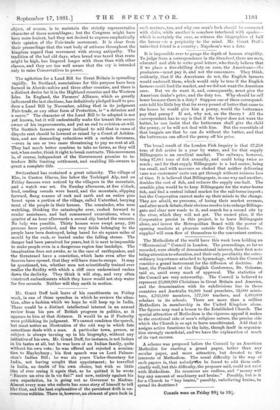Switzerland has sustained a great calamity. The village of Elm,
in Canton Glarus, lies below the Tschingel Alp, and on Friday fissures were noticed by the villagers in the mountain, and a watch was set. On Sunday afternoon, at five o'clock, loud, rending sounds were heard, and the mountain, slipping -forward, flung masses of rock and earth and an entire pine forest upon a portion of the village, called Unterthal, burying -most of the people in their houses. The remainder, who were -watching, thinking the catastrophe over, rushed forward to render assistance, and had commenced excavations, when a quarter of an hour afterwards a second slip buried the rescuers. No help was possible. Thirty houses were swept away, 200 persons have perished, and the very fields belonging to the people have been destroyed, being bared for six square miles of mould by the rush, or buried under the falling stones. The danger had been perceived for years, but it is next to impossible to make people even in a dangerous region fear landslips. The imagination does not awake, 82 in the case of earthquakes, and the threatened have a conviction, which lasts even after the fissures have opened, that they will have time to escape. It may be questioned, too, whether men not scientifically trained ever realise the fluidity with which a cliff once undermined rushes -down the declivity. They think it will stop, and very often construct embankments which they know would not stop water "for five seconds. Neither -will they earth in motion.






























 Previous page
Previous page